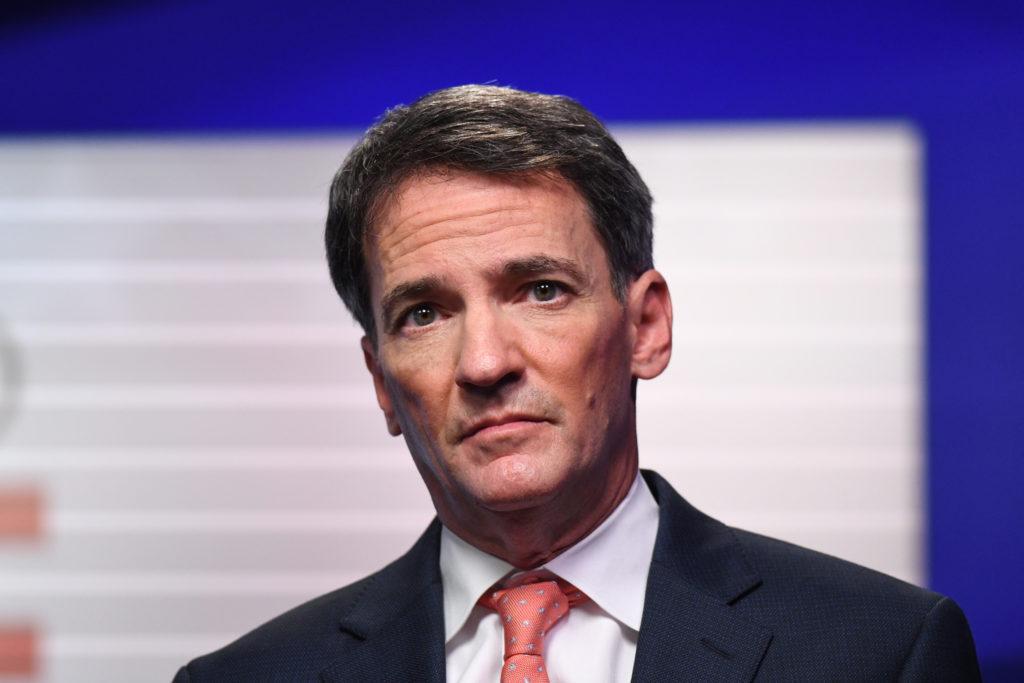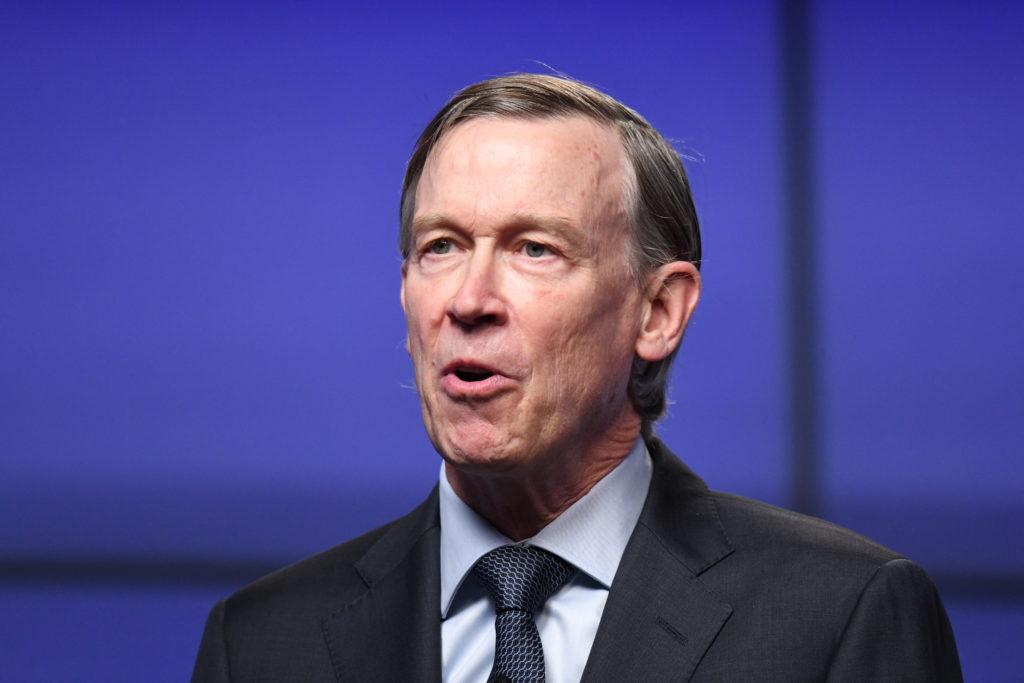
John Hickenlooper and Andrew Romanoff, Colorado’s 2020 Democratic candidates for U.S. Senate, met in a television studio for a debate Tuesday night. It was their first — and only — one-on-one event to be held in person before the primary election ends on June 30.
The men stood six feet apart in the studios of Denver 7 for a 90-minute debate that was also sponsored by CPR News and The Denver Post.
Romanoff assailed the “unholy alliance” of business interests in politics, including blistering critiques of his own party, while Hickenlooper talked about bringing pragmatic Colorado knowhow to Washington, D.C.
It was the candidates’ longest faceoff yet, and the last chance for many voters to see the two men hash out their policy differences and discuss their electability before casting their ballots, which have already been mailed to voters.
The debate touched on a number of topics from police reform and health care to religion, and especially included criticism of the man they both hope to challenge this fall, Republican Sen. Cory Gardner.
- Full Video: Hickenlooper And Romanoff Face Off In Final Colorado Democratic Senate Primary Debate
- Romanoff vs. Hickenlooper: Meet the men facing off to challenge Republican Sen. Cory Gardner
- Andrew Romanoff: Where the candidate stands on defunding police, medicare for all and more
- John Hickenlooper: What was the former governor's ethics complaint all about?
Romanoff and Hickenlooper seemed more relaxed at the podiums than they did in last week’s televised debates, which were hosted remotely by video. They reinforced their campaign messages while taking a few jabs at each other.
Hickenlooper, a former two-term governor, has the support of the national Democratic establishment and has focused much of his attention on Gardner. On Tuesday he continued to deliver his message about taking a practical approach to fix what he sees as dysfunction in the U.S. Senate.
“I’ve been in public life a long time, 16 years, and my loyalty has always been to the people of Colorado,” Hickenlooper said. “I want to be a doer. I want to be part of the change.”
Romanoff, former speaker of Colorado’s state House, is challenging Hickenlooper from the left. He’s facing a fundraising disadvantage: Hickenlooper has raised four times as much money, with the latest round of fundraising due to be made public later this week. But Romanaff touted endorsements from 400 local elected officials and a grassroots campaign.
“When I win this seat, it will be in spite of the opposition of my own party leadership in Washington,” he said. “I'm in this race and in this fight because I know too many folks in Colorado who feel like their voices are drowned out by the kind of pay-to-play politics that's corrupted Congress and soured people on even participating in the process itself.”

On race and equity
As people around the world continue to call for an end to police brutality and protest the killing of George Floyd, Hickenlooper tried once again to dispel critiques that he’s out of touch with this moment in history.
“I've stepped on my own words around Black Lives Matter,” he said, referring to his earlier use of the phrase “every life matters” during a racial justice forum, and his error during an earlier debate to say George Floyd was shot.
On Tuesday, Hickenlooper continued: “Black lives matter. There is a time where we have to step back and recognize that slavery is a nagging, persistent shame of this country that’s denied the promise of equality for far too long, to far too many people.”
He also apologized for the words he said in a video, made public this week but filmed in 2014, where he compared politicians to slaves rowing “ancient ships.”
“I deeply regret them,” Hickenlooper said.
Both candidates said they hadn’t done enough in their earlier elected roles to address systemic racism. And Romanoff said the effects of racism were obvious in the election itself: The Democratic primary at one point had a crowded, diverse field with mostly female candidates, as well as people of color and members of the LGBTQ community.
"We ought to recognize that the three finalists for the U.S. Senate all happen to be white men. It’s no accident,” Romanoff said, referring to himself, Hickenlooper and Gardner.
On climate and environment
Hickenlooper argued that the solution to climate change rests in new technology and changes in the markets.
“I want to make fracking obsolete,” he said.
But Hickenlooper wouldn’t support an outright ban on the drilling technology. He said climate change is an existential threat and pledged to get people together in Washington, D.C. to get things done.
“We can, in real-time, transition away from coal, transition away from oil and gas and, and move into this new world of renewable energy, wind and solar, hydrothermal. And at the same time, save money and drive the economy,” Hickenlooper said.
Romanoff dismissed that as incrementalism and said there’s a fierce urgency to take action.
“We've ignored it for decades. If we were having this conversation, say 40 years ago,” he said. “We could afford to indulge the sort of incremental approach that other candidates are proposing. But it's too late for that. We’ve run out the clock.”

The economy
Both candidates called for greater government support to pull the country out of the crisis caused by COVID-19.
For Hickenlooper, the next round of federal stimulus money would be all about providing resources to small businesses and access to capital.
“That’s really what drives our economy here and throughout the country,” he said.
“There’s always a bias … toward the largest corporations,” Hickenlooper continued, who spent years working in the restaurant industry and founded a brewpub. “I would focus on the truly small businesses.”
Romanoff agreed that small businesses don’t have access to loans, and said it’s because the benefits are concentrated at the very top, with larger corporations. He put the onus on both political parties.
“Those giant companies put politicians on their payrolls … Democrats too often have also been seduced by corporate cash,” Romanoff said.
He previously called on Hickenlooper to withdraw from the race over his ethics violations involving corporately sponsored travel.
Romanoff said federal benefits should go toward people in the middle, and Americans that are struggling to make ends meet. He called for an acceleration of a COVID-19 vaccine and for testing, tracing, isolation and treatment and said he will fight for universal health care.
Different approaches to law enforcement and the military
Romanoff argued for a funding reduction to the U.S. military.
“Clearly it is cheaper and smarter and wiser for us to engage in diplomacy and international development and peace than to arm ourselves to the teeth,” he said.
Hickenlooper agreed that diplomacy is a greater necessity than ever, but he committed only to the fact that defense spending is “long overdue for a comprehensive analysis.”
Romanoff, who recently spent four years leading Mental Health Colorado, has also called to shift funding from police to other community services such as mental health.
“Turning our jails and prisons into warehouses for people who suffer from mental illness or drug addiction is the single most expensive and least therapeutic decision we could make,” Romanoff said.
Hickenlooper said he wants to focus on law enforcement changes such as banning chokeholds, requiring body cameras, banning no-knock raids, and limiting when the use of force is allowed, and holding law enforcement officers accountable for misconduct.
On ICE, Romanoff supports defunding the immigration agency, and Hickenlooper wants to make reforms.

Where they agree
In lightning-round questions, the candidates largely said they support numerous liberal positions, including:
- Doctors should not have legal protections if they refuse to treat transgender patients
- DACA recipients should be given U.S citizenship
- The U.S should increase social security benefits, although Hickenlooper said he would back that “cautiously”
- Both men called for changes to the Electoral College, allowing the presidency to be determined by the national popular vote. It was a seemingly new position for Hickenlooper, who told The Colorado Sun in 2019 that he wasn’t ready to change the system, saying the “Founding Fathers got things pretty right.”
- A ban on all assault-style weapons
- Colorado should not ban abortions after 22 weeks
- Colorado should increase taxes on tobacco
- Support a U.S Senate resolution to make Juneteenth a federal holiday
- Some sort of reparations to right the wrongs of the impact of slavery in U.S history
Ballots are in voters’ hands and should be mailed back no later than June 22, with a first-class stamp, to guarantee they’re counted. Ballots can also be returned to voting centers and dropboxes until the evening of June 30.









